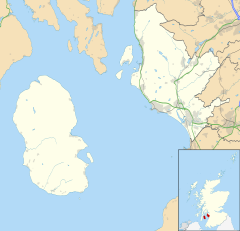West Kilbride
| West Kilbride | |
|---|---|
 West Kilbride from Law Hill |
|
| West Kilbride shown within North Ayrshire | |
| Population | 4,393 |
| OS grid reference | NS205485 |
| Council area | |
| Lieutenancy area | |
| Country | Scotland |
| Sovereign state | United Kingdom |
| Post town | WEST KILBRIDE |
| Postcode district | KA23 |
| Dialling code | 01294 |
| Police | Scottish |
| Fire | Scottish |
| Ambulance | Scottish |
| EU Parliament | Scotland |
| UK Parliament | |
| Scottish Parliament | |
West Kilbride (Scottish Gaelic: Cille Bhrìghde an Iar) is a village in North Ayrshire, Scotland, on the west coast by the Firth of Clyde, looking across the Firth of Clyde to Goat Fell and the Isle of Arran. West Kilbride and adjoining districts of Seamill and Portencross are generally considered to be a small town, having a combined population of 4,393 at the 2001 census.
A Neolithic cup and ring marked stone is located on Blackshaw Hill, near West Kilbride. This stone is unusual, in that it is carved with three spirals. Although the purpose of such stones is not known, it is considered that they may have had religious importance.
Traces of an Iron Age fortification were uncovered when the house named "The Fort" was constructed in Ardrossan Road, Seamill.
West Kilbride is generally believed to be named after the ancient Celtic Saint Brigid of Kildare, often known as St Bride. The name suggests there was once a cell or kil to Brigid in the area, although local legend has her visit to establish her church around 500 AD (the landing point was supposedly in front of the now Seamill Hydro. The "West" prefix was added to distinguish between other places which commemorates the same Celtic saint, such as the new town East Kilbride in Lanarkshire which was named "East" to distinguish it from the older "West". There has been a hamlet in the area since 82 AD when the Roman general Agricola stationed 30,000 troops in the area of the village now known as Gateside. Roman roads can still be explored around the village to this day, and many Roman finds have been reported and lodged in Museums throughout Scotland. William Wallace's uncle Crauford had an estate at Corsbie in the North of the village, and this is still in use as a caravan park called Crosby, to this day (Wallace's mother's family). In later years Robert the Bruce gave a grant of the lands of the Barony of Kilbride to the Boyds of Kilmarnock. It was once home to various mills and other works, and in the 18th century West Kilbride was primarily a weaving village.
...
Wikipedia

